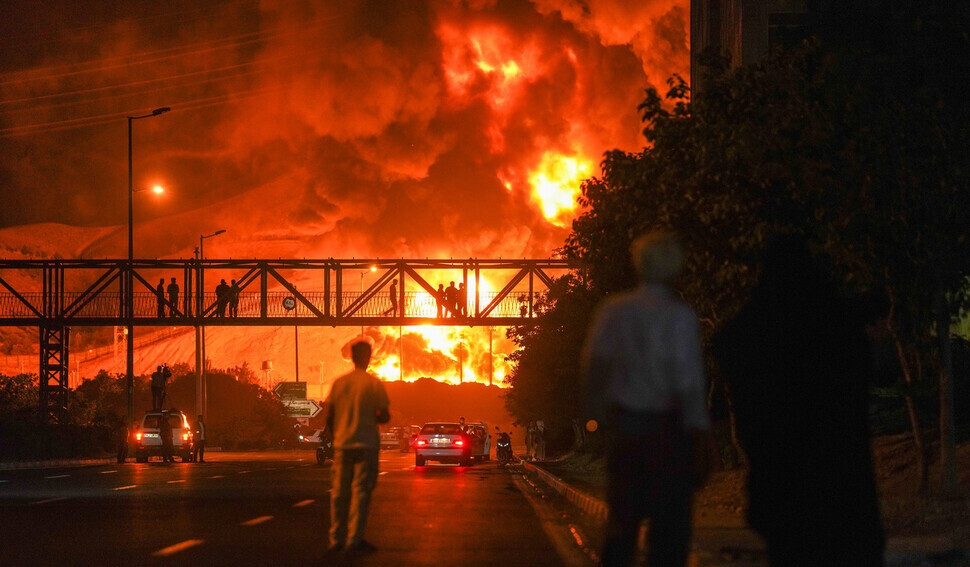
Tehran/Jerusalem – The conflict between Israel and Iran has dramatically intensified, now entering its fourth day, with both nations engaging in severe reciprocal airstrikes. A recent statement by Israeli Prime Minister Benjamin Netanyahu has fueled speculation that the ultimate goal of Israel's sustained offensive may be the destabilization and eventual overthrow of the Iranian regime.
Speaking in a Fox News interview yesterday, Netanyahu suggested that regime change in Iran "could certainly be a result" of Israel's military efforts, citing the Iranian regime's perceived weakness. He further justified the attacks as a measure to protect not only Israel but also the world, claiming the discovery of enough enriched uranium to produce "nine nuclear bombs" and vowing to prevent a "second Holocaust, a nuclear Holocaust." This assertion, however, has been widely disputed by experts. Jeffrey Lewis, director of the East Asia Nonproliferation Program at the Middlebury Institute of International Studies, vehemently called Israel's claim of Iran possessing sufficient enriched uranium for nine nuclear bombs "completely false," referencing International Atomic Energy Agency (IAEA) reports that indicate Iran's uranium enrichment level is at 60%, falling short of the 90% required for weapons-grade material. The IAEA itself recently censured Iran on June 12 for failing to comply with nonproliferation obligations.
The current escalation, codenamed "Operation Rising Lion" by Israel, began on June 13 with an unprecedented series of Israeli airstrikes deep within Iran. Initial strikes reportedly targeted and killed top Iranian military figures, including the Chief of Staff of the Iranian Armed Forces and the Commander of the Islamic Revolutionary Guard Corps (IRGC), along with prominent nuclear scientists. Subsequent attacks have broadened to encompass over 250 targets and 720 facilities, including critical infrastructure beyond just nuclear sites. Today, Israel specifically targeted the headquarters of the elite Quds Force, a special unit within the IRGC responsible for coordinating support for pro-Iranian militant groups like Hezbollah and Hamas, and reporting directly to Supreme Leader Ayatollah Ali Khamenei. The Washington Post noted that Israel's strategy appears to be aimed at "weakening the Iranian regime and economy by attacking its industrial and social infrastructure, thereby triggering regime change."
Iran has retaliated fiercely. Today, Iranian ballistic missiles struck central Israeli cities, including Tel Aviv, Haifa, and Petah Tikva, causing at least eight fatalities. Reports from Iranian media suggest at least one hypersonic missile was used in the attack on Haifa. The U.S. embassy annex in Tel Aviv sustained minor damage, leading to the full closure of the main U.S. Embassy in Israel. Overall, since the initial Israeli strikes on June 13, at least 224 people have been killed in Iran, with Al Jazeera reporting that 90% of the casualties are civilians, including 70 women and children. In Israel, the Prime Minister's office confirmed 24 fatalities from Iranian retaliatory attacks.
Experts are assessing the evolving dynamics. Trita Parsi, Vice President of the Quincy Institute for Responsible Statecraft, remarked that Iran, despite losing key military commanders, is rapidly reorganizing its forces. Parsi suggested that "Israel underestimated Iran's capacity to regroup," highlighting that Iranian missiles have successfully penetrated Israeli air defense systems.
Diplomatic efforts to de-escalate the crisis remain stalled. While U.S. President Donald Trump has repeatedly expressed hope for negotiations between Iran and Israel, Iran has firmly stated that no talks will occur as long as Israeli attacks persist. Trump, while acknowledging that "sometimes countries have to fight it out," also indicated a willingness to mediate, similar to the U.S.'s role in de-escalating tensions between India and Pakistan last month. However, he evaded direct questions about whether the U.S. had urged Israel to halt its airstrikes.
The international community watches with growing alarm. The United Nations and numerous countries have called for restraint, fearing a wider regional conflagration. The economic fallout has already begun, with a sharp rise in oil prices, disruptions to global shipping, and the suspension of air traffic in parts of the region. The International Atomic Energy Agency has also expressed deep concern over regional stability and the potential impact on nuclear facilities in the area. The current escalation marks a perilous new chapter in the long-standing animosity between Israel and Iran, with the possibility of broader, destabilizing consequences for the entire Middle East.
[Copyright (c) Global Economic Times. All Rights Reserved.]



























